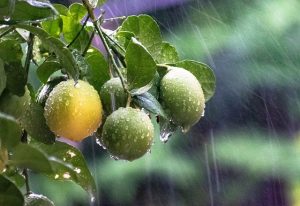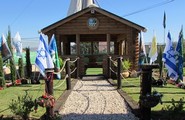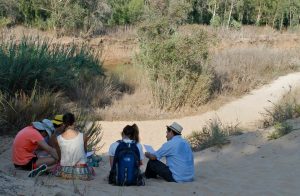 There are families with lots of birthdays in the same month. Or who have yahrzeits (anniversaries of deaths) close to public holidays. Or institutions or countries who have lots of historic days. These often get combined and turned into one day marking many events.
There are families with lots of birthdays in the same month. Or who have yahrzeits (anniversaries of deaths) close to public holidays. Or institutions or countries who have lots of historic days. These often get combined and turned into one day marking many events.
This phenomenon was reflected in a light-hearted activity in which people received the names of the Jewish holidays and were asked to decide when in the year to mark them. A creative suggestion was to take all the sad days (9 Av, holocaust day, memorial day for Israeli soldiers, minor fasts) and put them all together in one week in the winter – same idea, let’s get everything over with in one sad week and then move on.
Where this really happens, of course, is 9 Av itself which commemorates everything from the spies returning to Moses with a bad report about the Land of Israel to the bombing of the community center in Buenos Aires. No doubt some of the many events associated with this day happened on or close to 9 Av but others were attached to it for convenience.
The impulse is an understandable one. Having too many memorial or celebratory days diminishes the impact of each one. One day that marks many events makes it stronger and more attractive. We can all have fatigue from over-celebrating/commemorating.
 An example of where a holiday is in the process of gathering extra meanings is Tu B’Shvat. Tu B’Shvat marks the point when the ground has become soaked with the rains of the new year, causing the liquid to start rising in the trees, which means that the trees can begin to give fruit (Rashi) or the moment that trees get their life source from the water of the new year rather than relying on water from the previous year (Jerusalem Talmud). The day has halachic (Jewish legal) significance in terms of tithes and allowing fruit to be eaten that has grown for three years.
An example of where a holiday is in the process of gathering extra meanings is Tu B’Shvat. Tu B’Shvat marks the point when the ground has become soaked with the rains of the new year, causing the liquid to start rising in the trees, which means that the trees can begin to give fruit (Rashi) or the moment that trees get their life source from the water of the new year rather than relying on water from the previous year (Jerusalem Talmud). The day has halachic (Jewish legal) significance in terms of tithes and allowing fruit to be eaten that has grown for three years.
There are other new years for other agricultural events. For example, 1 Tishrei (Rosh Hashana) is, every seven years, the beginning for the sabbatical year when fields lie unused. It is also the day for calculating tax on vegetables and grains. And 1 Elul (a month before Rosh Hashana) is the day for calculating the tithing of cattle. Yet, for most Jews, Tu B’Shvat (15 Shvat) is the day for all things Jewish and land-connected. Just as 9 Av has become the catch-all day for sad events, 15 Shvat has become the across-the-board day for thinking about nature.
Customs for the day include:
- Eating a new fruit
- Eating 15 different fruits one for each day of the month until the holiday
- A special mystical seder
- Planting trees locally or in Israel
Try something new this Tu B’Shvat, for yourself and for those around you.
Be well, DLK
Rabbi David Levin-Kruss, Yesod Jewish Learning Director
Jewish environmental activism and education
As the world becomes more and more aware of how our actions threaten to destroy the environment, a new element has been added to 15 Shvat and it has become a day for education and activism about issues such as pollution, global warming, and wasting of resources.
Visit the sites below to explore some of what is happening in the world of Jewish environmental activism and education. While only one of these organizations is in Europe, many of them offer programs internationally especially in these corona times. Or look at what they are doing and let that inspire you to create your own, local version:
|
Sadeh Sadeh is a farm and environmental community center based on Jewish values. They engage in agriculture in a way that renews the land and also do work in Jewish engagement and interfaith community building. |
 |
|
Keren Kayemet The Jewish National Fund was founded in 1901 to buy and develop land in Ottoman Palestine for the Zionist enterprise. Still active, today it is involved in many issues including working and educating for an environmentally responsible future. |
 |
|
Jewish Eco Seminars Jewish Eco Seminars (JES) engages and educates the Jewish community by revealing the powerful connection between modern Israel, ecological innovation, and Jewish values.
|
 |
|
Hazon Hazon strengthens Jewish life and contributes to a more ecologically balanced world through immersive experiences and through inspiring individuals and communities to change. |
 |
